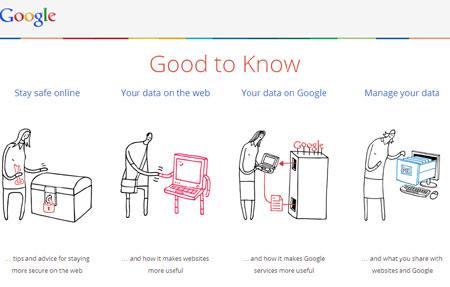Negotiate, strategise, campaign
Google is trying to be this weird thing: an unassailable behemoth with a conscience. But what if you don't want the 'beautiful, intuitive experience' being promised?
SEVANTI NINAN on free speech and privacy challenges. Image: Google~s privacy policy video.
_150_200.jpg)
MEDIA MATTERS
Sevanti Ninan
January 2012 has demonstrated that there are no unmixed blessings. Not the grand Jaipur Litfest, not the Internet, nor the abundant possibilities of Twitter and Google. Between community sensitivities, the law, and technology, it can begin to feel claustrophobic. The first two deny the freedom to offend or abuse in the name of free expression, the latter the freedom to have a free ride on the Internet.
But common sense suggests that it can hardly be otherwise. If there are millions of people who feel strongly about religion and ethnicities, free expression has to pick its way around these or confront protests which are sometime violent. India lives in different centuries at the same time, its law keepers have to decide whom to placate at which point, and how genuinely representative a protest might be of wider sentiments. It requires far more nuanced governance and policing than we have been seeing.
As for Twitter, forced last week to announce that it will censor and declare, technology companies are having to decide when governments can be resisted and when not. Yahoo went to court against a fine imposed because it would not reveal user identity, for the others it is early days yet.
And if millions of people have to use a highway like the internet without slowing it down, can either limitless email, or high speed search or unlimited video hosting come for free and untrammelled by advertising? In India alone television companies routinely upload hundreds of shows daily on YouTube to save themselves server hosting costs. Don’t like Google’s new privacy policy? The option is to pay for its services.

Google is trying to be this weird thing: an unassailable behemoth with a conscience. ‘Our algorithms will monitor what you do at every step, we will share some of the data we gather on you, but we’ll help you protect your privacy.’ Huh?
‘We are giving you a choice, but we are not giving you a choice. You can refuse cookies but some services may not work as well. Our technology reads your mails as you write them but that’s only to prompt you with advertising which might interest you. We’re not snooping!’
What if you don’t want the ‘beautiful, intuitive experience’ being promised? Umm, you don’t really have a choice. Try imagining life as a journalist without their search, without YouTube, though fortunately one does live one’s life without GMail. If you have an android phone though, there is no escaping Google.
Google will monitor usage information and we think that’s uncalled for. But they tell you they do so, other Internet giants like Facebook are doubtless using cookies as much to have relevant advertising pop up. But they don’t explain as much. Those who under-communicate get away with it—those who over-communicate get flack. Though it is difficult to see a corporation as big and powerful as Google as a victim of its greater transparency.
So what does the vast, communicating public do? Recognise that there are limits. To creative licence, as much to free services on the Internet. Decide if and when those limits are genuine and strategise accordingly.
Rushdie asserted in his interview with Barkha Dutt that he would have thought that the vast majority of Muslims in India had far more to worry about in their daily lives than a book written by him. Possibly, but that does not stop a vocal minority protesting in their name. The state has to take a call on how and when to enforce law and order. We are not short of people taking offence to draw attention to themselves. Just this morning there were two front page instances of right wing intolerance. Symbiosis University in Pune cancelled the screening of a documentary on Kashmir after the Akhil Bharatiya Vidyarthi Parishad protested, and Shiv Sena goons (The Hindu actually called them that in its headline) vandalised the Times of India office in Mumbai to protest reporting they did not like.
Universities need to take a stand, and the state needs to back them up with protection.
And where “who pays for the Internet” is concerned, if individual users are losing more privacy to generate more revenues for firms like Google because corporate users are also getting a free ride on the Net, its time to educate, strategise and campaign on the issue of who should share the costs of maintaining a faster, constantly technologically upgraded, Internet.